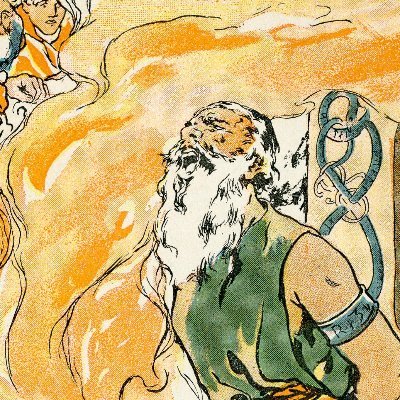The large number of "wrong" responses is because, for conservative Evangelicals, this is almost a trick question.
The statement is a conciliatory stock phrase used by Jewish people to explain their stance on Jesus to Christians in a diplomatic way. The reaction they're hoping for is "respectful disagreement", or, if you like, the reaction they're hoping to avoid is "hostile disagreement". I don't hold it against anyone for trying to head-off antisemitism, but the situation where it's most likely to be used is between right-wing Jews and frequently-less-than-tolerant right-wing Christians. It's an important stance to take for right-wing unity, and any Evangelical who listens to or watches a lot of right-wing media will have heard it.
The takeaway from these responses isn't "40% of American Evangelicals reject the Council of Nikea", it's "40% of American Evangelicals soyfaced when they saw something the smart conservative man on the radio said". Being Evangelicals, everyone gave the response they thought they were supposed to give, and only 60% knew that the "correct" response to this statement is "polite disagreement" rather than "agreement". If the statement had instead been a relevant segment of the Nikean Creed, they would have received a much larger portion of "correct" responses.
Very informative. But it's still fucking wild that something so subtle could get them to ignore literally the main thing about Christianity. Some Catholic teacher would kick you down a well for saying that.
Basically every Christian west of Baghdad who studied theology would, yeah. I went to a Christian elementary school and I was taught that belief in Christ's divinity is a necessary part of being a Christian, though now that I know more about the history of the religion I would disagree with that.
Smart point. Though I wonder if we'd see a similar shift in other conservative, more established denominations: my hunch is maybe we wouldn't, as I think the evangelicals are more doctrinally flexible (as there is less established doctrine).
Evangelicalism isn't a denomination in its own right, though I imagine that could change over decades and centuries. Christians of multiple Protestant denominations identify as Evangelicals. It's not that those denominations don't have doctrine, it's that Evangelicals as a group tend to be somewhat hostile toward education so they never learn it. That's not to say that there are no Evangelicals who are interested in theology - this survey was conducted by some - they just don't realize that they're out of place in their own movement. They are salty about a bunch of the responses to the more cerebral statements, and the only thing Evangelicals seemed to almost universally agree on are the anti-sex and anti-abortion statements.
It’s not that those denominations don’t have doctrine
:doubt: I've yet to see evidence that Evangelicals have ever seen theology or are even aware that the concept exists. Their religion seems to be hating various modern culture groups and accusing random things of being Satanic, with very little complexity beyond that.
It’s not that those denominations don’t have doctrine, it’s that Evangelicals as a group tend to be somewhat hostile toward education so they never learn it.
Okay, I think my point of disagreement is that Evangelicals can be meaningfully considered part of other denominations. Everything I've seen, read, and heard about them suggests that Evangelicals and their religious leaders are wholly uninterested in theology, history, or anything else that would ground or restrict their interpretation of Christianity, and instead they just scream about culture war bullshit very loudly then yell incoherently about Jesus to given it a veneer of Christianism. Like Evangelicalism is the elevation of your own personal political and cultural :brainworms: to the position of god. Just a totally solipsistic, masturbatory adventure in self-righteous hate.
Like I cannot really put in to words how much contempt I have for Evangelicalism as a so called religious practice.
I think that Evangelicals will decide to become their own denomination sooner or later, but at present Evangelicals do nominally belong to a variety of denominations and practice differently according to those denominations, even if they refuse to learn why they do this or that ritual a certain way or why they do or don't do certain rituals at all - the point isn't to understand, the point is to do what you're supposed to. I don't think we disagree about the merits of the movement.
My father both went to and later taught at seminary. Theology is incredibly important among some groups. Not your Christmas and Easter MAGA christians but to actual believers many get very into the weeds on the theology. Gotta understand your adversary to combat them, don't just assume they're all unread morons.
But the majority who are unread morons low-key hate the ones who aren't.
Yes on all of above; other than the lack of establishment (hierarchically, theologically), the defining characteristic is political/cultural, imo
Evangelicals out here rejecting the Council of Nicaea, nice,
lets follow it up with a wave of prosecutions and burnings like last time :free-real-estate:
Heretics. Their only god is mammon. western “Christianity” needs some fire and brimstone shit to purge these self-absorbed heathens
Shit that's enough for me. Fire up the Inquisition kids we're gonna roast some idolaters!
You may say "Frank! You're an atheist and openly contemptuous of religion, isn't it hypocritical to advocate for religious persecution of someone just because you dislike their theology?"
To which I say; Only god can judge me and god isn't real. Now do you want to do some iconoclasm or not?
I like the implication that the PSL believes Jesus was American
As a Palestinian PSL would give him citizenship or asylum so it kinda checks out
Catholicism is a gateway to abilities some would consider... unnatural.
As a former(? - Still go to church with family sometimes) Catholic, I never got that shit.
This is the diagram I never got
Jesus is God but The Father is not Jesus. So God's got split personalities or something? Also never got what exactly the Holy Spirit is, i guess it's supposed to be like the force in Star Wars or something? Idk how the heck they let me get confirmed as a child even though I can't explain it even after doing more readings of theology than was deemed necessary.
We explicitly don't have multiple gods like pagans, even though the whole praying to saints thing was a reason for Eastern Orthodox splitting off since they made a decent argument that it's idolatry/soft-paganism.
Almost no one can explain it in their own words. I guarantee if you went to a church and asked them to, 99% would be confessing a heresy. You're supposed to repeat the words they give you without understanding it as a form of establishing authority. They don't actually care what any of the congregation believes about the trinity, because it doesn't matter beyond a tool to browbeat you into parroting whatever they tell you without question /neckbeard
Any kid at CCD or in parochial school could explain it to you lol
I was raised Catholic and went to Catholic high school; no they absolutely can't.
Yeah, this. Catholic Theologians have been arguing about it for like 1800 years without coming up with an even remotely satisfying conclusion that any real human can understand.
Lmao. Put it in your own words then, so I can tell you which heresy you're confessing.
tool to browbeat you
Love to have a good faith argument, but I think you're more at home whining on r atheism
Are you Catholic? I'm wondering because I think the person who replied an explaination gave me what seems to be the more Pentecostal version.
Every explaination I've seen where I went "yeah that sounds like it makes sense" is considered heresy by someone else.
I think when I asked a priest once as a kid, he gave me an answer about the mystery of the Holy Spirit which I wasn't really satisfied by, but maybe he thought I was too young for a better answer?
I'm sure there's many competing explanations of the Trinity, as there are of God generally. I wouldn't contend that all explanations are the same, or that one version is correct, or anything about, like, the ontology of God, but I think people can have deeply held beliefs, and can articulate them even if they can't give the most, best coherent description of them, and that these articulations aren't just attempts to brainwash or whatever.
Mostly I think Catholic kids could give an explanation of Trinity, and certainly it wouldn't be like you were talking to Aquinas, it would be as good an explanation as a kid could give for anything else
I guess that's the issue for me, because that lay-explaination of the Trinity isn't really satisfying to me because I could probably give one too,
but I'm also aware that there's competing explainations, and I don't know the exact one whose team I'm 'supposed' to be on as a Catholic.
This is probably all moot because I don't think anyone converts from one Christianity to another based on their Holy Trinity explaination, but it is part of the many things that made me agnostic after going to state-funded Catholic school.
Was raised Catholic. Yes, Im not sure I could give a very nourishing description of the Trinity, other than God having three constitutive aspects, none being more essential than another.
And i'm not well versed enough theologically to explain why that is seen as a more powerful explanation than alternatives, but generally my feeling is that any of these are attempts to speak upon what seemingly definitionally can't be spoken upon, so it's hard to read the statements themselves or the speakers as wedded to ontological commitments, but rather at gestures at something broadly valuable or true.
But the particular idiom or specific language that attempts to describe that truth seems valuable to me (here the Catholic language of the Trinity). Fwiw, I find the redemption aspect of Christianity very attractive; Catholicism perhaps too, but maybe only because of cultural/traditional reasons.
Im glad I got to be here in time to :PIGPOOPBALLS: a troll
sick ableism brah
It's literally a mystery and you're not supposed to understand it.
So God’s got split personalities or something?
In naturalist terms, they are like the leaves of a clover. Separated, but as part of the same plant.
In gamer terms, Jesus is God's player character while on Earth.
Am gamer, can confirm that the trinity is easy to understand in this framing
That's a heresy, Patripassianism possibly.
Jesus is more like if God had uploaded himself into the game, but had also uploaded himself into a Populus-Style game layer as the Holy Spirit, while playing a Sim Earth aspect all at once while also having realtime awareness of all three aspects.
This is also a heresy, probably because it splits the persons too much and doesn't make them co-eternal.
That’s a heresy, Patripassianism possibly.
No, Patripassianism would only hold if dying in the game means you die in real life.
As a simulated Avatar of God, Jesus was one with God in the spiritual sense but wholly separated in the physical sense.
Jesus pleading to God at the Mount of Olives was canonically a cut scene that broke the fourth wall. This was even more ironic, because God was also the Lead Dev on the game, meaning that Jesus was both literally and figuratively talking to himself despite being a distinct entity from his audience.
Thus it is that only a True Gamer can comprehend the most sacred mystery of faith.
Christ has died. Christ is risen. Christ will come again.
Just because I can, let me put on my Catholic hat and give my best stab at explaining it, without Googling, from that perspective. See my other comment for the actual answer.
First off, don't try to understand the Trinity though analogies, period. The Trinity is conceptually unlike anything else that you can encounter, and trying to conceptualize it that way is likely to wind up being more like a heresy.
The Son, the Father, and the Holy Spirit, are three distinct persons, but they are all one God. Note that I did not say that they are parts of God. Each of them possesses the full essence of "Godness," but there is only one God. They don't break apart and form up again like Voltron, nor are they different aspects of God, nor are they different roles that God performs, each is a distinct person, while still possessing the full quality of Godness. They are not split personalities, just as you and I are not split personalities, but distinct people. What is it like? Again, it is like nothing, there is no comparison to it on Earth.
Each of these persons has existed since the beginning of time, none of them predate each other, none of them created - or perhaps I'd better stick with "made" - each other, and yet, the terms "Father" and "Son" are not merely symbolic or metaphorical, but literal. The Father "begat" the Son ("Begotten, not made, one in being with the Father"), while both of them have always existed. It's worth noting that God exists outside of time, so everything checks out. The Holy Spirit was there too.
They are all composed of the same substance, by the way - what that substance is, I have no idea - but in any case, they are consubstantial.
If you're lost at this point, it's worth looking at how this understanding was originally developed:
Rome created the Church to co-opt Christianity and establish uniform beliefs supportive of the EmperorRigorous debates between the smartest, most enlightened, and totally politically independent scholars that the fourth century had to offer, presided over by the Roman emperor Constantine, who had sincerely converted and was appointed by God to ruleover an imperialist slave state.Ahem. What I mean to say is, each of the seemingly arbitrary stipulations has a logical reason behind it. For example, if the Son were created by the Father, that would imply that the Son is lesser than the Father. If the Son was not literally begotten by the Father, that would imply that the Father only "symbolically" sent and sacrificed His only Son to save us, which would lessen the significance of it. If there was a time before the Son existed, that would imply that the Son is not eternal, that there could be a time when the Son will no longer exist, which is no good.
Likewise, with the various stipulations around the "Three Persons, One God" bit. To say that they are each fully divine, and distinct, so therefore there are three Gods, would contradict fundamental teachings from the Old Testament. To say that they are each parts that make up God would imply that Jesus was not fully divine, and that whenever He (or the Holy Spirit) split off to do something, the Father isn't wholly divine either. To say that they are merely aspects, personas, or split personalities, would imply that only that aspect was sent to suffer and die on the cross. If they were only distinct "roles" that God takes on, then when Jesus died, what, God just stopped playing that part? Or did the Father die at the same time?
The seemingly convoluted and contradictory teachings came about in a large part to establish and maintain the significance of Jesus's death. The implications of deviating from these teachings are not really apparent to lay people, but the Church scholars considered the implications of each word very carefully.
They definitely weren't using the same kind of reasoning behind "You can't end a sentence with a preposition because it'd be improper in Latin," only with hangups based around Greek philosophers like Plato. And they fought tooth and nail over this and burned everyone who disagreed, not because of any materialist or political reason, like, say, Rome only being willing to tolerate a single version of Christianity, which recognized the Emperor as being appointed by God. They were just, you know, really passionate, and anyway we all went a little crazy after 311, or something like that.
Anyway, it's not designed to make sense, or to be intuitive, and the reason people have trouble understanding it
aside from it being full of contradictionsisn't because "The Lord works in mysterious ways," but because the teachings were developed based around considerations of what scholars 1600 years ago thought that the Greek words implied. If you really want to understand the Catholic teachings on the Trinity, don't just rely on faith, or read the catechism, or even ask a priest - that's the route you should go if you don't actually care that much and just want some platitudes. Research the various heresies of the time, look up what positions and arguments were put forth by the Church scholars, study Plato too, and hell, maybe learn Greek while you're at it.Better yet, spend your time doing, like, anything else.
"Quantum mechanics is hard to understand and difficult to explain because it doesn't relate to anything in the observable scale of the world"
Catholics: Hold my communion wine.
Hold my literal not metaphorical or symbolic chalice of christs blood
Cannibal Cult except but the concerts are boring.
...
Oh wait shit I think I was thinking of Cannibal Corpse and then the joke doesn't work.
and here I was thinking it was a way of getting around the 'omnipotent, omnicognizant, and all-loving' paradox. Mormonism really did itself a favor by breaking from this tradition.
The Son, the Father, and the Holy Spirit, are three distinct persons, but they are all one God. Note that I did not say that they are parts of God. Each of them possesses the full essence of “Godness,” but there is only one God. They don’t break apart and form up again like Voltron, nor are they different aspects of God, nor are they different roles that God performs, each is a distinct person, while still possessing the full quality of Godness. They are not split personalities, just as you and I are not split personalities, but distinct people. What is it like? Again, it is like nothing, there is no comparison to it on Earth.
"It doesn't make any sense because it's a unique concept unlike anything else in the universe" is a copout. It doesn't make sense because it's bullshit that doesn't logically follow. If each of the three parts are fully realized faces of God then they're all God and if there's only one God then they're all the same entity. If they are fully separate then there must be something which makes them different which means they can't all be fully God. You're allowed to just say "yeah this is bullshit that doesn't make any sense"
Oh, absolutely it's weak af. I mentioned at the start that my other comment is my actual answer, that it's all BS. This answer is a "steelman," for if you want a better understanding of the Catholic perspective.
...and also to show that I know wtf I'm talking about, since I had someone tell me that "Any kid in CCD could explain the Trinity" and referring to my experience learning about it as "remedial education." Since they then refused to explain it, I thought I'd do it for them.
Yes, but also, is a photon a wave or a particle? describing it as either doesn't fully describe a photon, nor does describing it as a "wave packet" or "wave-particle duality". It's a photon, the type of thing a photon is is a photon. There's no macro-scale equivalent, try not to think about it too hard if you're not doing physics at something.
There is only one God but he plays three different roles, like having one actor do three different parts in a play. The three roles are distinct and independent from each other but is also fundamentally the same entity. This is why Jesus speak to the Father on the cross like they are two different people or how the Holy Spirit can touch people on Earth even though the Father and Son are wholly in Heaven, like they might appear seperate but it's all the same guy. How this is possible is one of the great mysteries of the faith.
Which is to say, this is all convoluted bullshit to keep Christianity monotheistic like Judaism even though they worship a real guy that lived and died and the early apostles kept talking about being touched by God.
There is only one God but he plays three different roles, like having one actor do three different parts in a play.
Oops, forgot 'roles' was not the preferred terminology, it should be 'persons' which indicates a higher degree of indiviualness. Although the word 'person' originally comes from the Greek 'persona' which is a mask or character in a play.
In any case, it's just a much easier explanation of the Trinity than the 10 page non-explanation in the Catechism, and functionally there is no difference.
Personally I would have wanted the early church to adopt docetism, which is obviously the correct doctrine since that is the one used in Islam (aka upgraded Christianity).
Yeah if you don't say 'persons' at some point you're fucked. Might get away with "people," but then you're on thin ice.
I think the official explanation is that Jesus was quoting one of the Psalms and he was fulfilling the prophecy, the Psalm was about the enemies of God mocking the faithful. And, becuase he was taking on all of humanity's sins at that moment, so he was giving a lament as a genuine sign that he was a fully corporeal human undergoing this trial. Also, saying that God had forsaken him isn't a loss of faith, just like the Psalm isn't losing faith in God, it's more like being a weepy baby and being overly dramatic whenever something goes wrong in your life.
The real explanation is that Jesus was a crazy white boy who talked mad shit and got executed by the Romans while all his bros stood by and watched. He thought he was the reincarnation of King David and he would kick all the Romans out of Jerusalem but ended but on a cross, so he probably did curse God as he was dying for all the bullshit that happened to him. Whoever wrote the Book of Mark then substituted in a quote from the Pslams because he didn't want Jesus' last words to be "Fuck you God". As a result the early church had to justify why Jesus would be talking to God when he was also God and ended up going with the Trinity.
I think the official doctrine is that they are "of the same essence" - metaphysically one and the same, but distinct as individuals. Or that's just another heresy and I'm going to hell - it's been a while since my church days.
No, that's correct. Or more formally
"Therefore in God there is only a Trinity, not a quaternity, since each of the three persons is that reality — that is to say substance, essence or divine nature-which alone is the principle of all things, besides which no other principle can be found. This reality neither begets nor is begotten nor proceeds; the Father begets, the Son is begotten and the holy Spirit proceeds. Thus there is a distinction of persons but a unity of nature. Although therefore the Father is one person, the Son another person and the holy Spirit another person, they are not different realities, but rather that which is the Father is the Son and the holy Spirit, altogether the same; thus according to the orthodox and catholic faith they are believed to be consubstantial."
Which makes about as much sense to most people as quoting a random Derrida paragraph.
I still haven't met anyone who can convince me one way or the other if Derrida was full of shit, trolling, or actually had something to say.
As someone who has read Derrida and listened to his (much more lucid) lectures, the answer is "Yes". He's mostly full of shit, and he's trolling in a deliberate attempt to obfuscate his ideas and prevent them from being co-opted by capitalist hegemony.
I may be spouuting a heresy so please correct me if i am wrong. I aint no christian anyway.
It is my understanding that we all have escence and form. My ecence is matter aranged in atoms molecules cells organs and then a person.
God is not made of matter it is made of divine substance wich in order to work has to have certain properties. Because of this when you make a person of it you can use the same substance to make another one. So they are consubstantial.
Close. The issue here is that Jesus is fully Human and Fully divine, in a hypostatic union (or a union of the two into one nature in practice, if you're Miaphysite which IIRC isn't considered heretical anymore)
So something being outwardly "matter" or not has no impact on its divine nature. See also Communion in Catholic/Orthodox (and some interpretations of Anglican doctrine) where the host is fully transformed into the divine but maintains its outward character.
Sorry for the late repply. Bussy holiday season. But dosent comunion involve transubstantiation. Wich esentialy changes the substance from regular mater to god stuff? The same can be saud for christ havig a human form and be substantially god.
But now that i think about it this would mean a shape is being predicated on god. Wich shouldnt be posible.
It does, but in order to dodge the "but it look like a biscuit, checkmate papists!" Argument there was some clarification on how that happens exactly.
Or to use the catechism
What is the meaning of transubstantiation? Transubstantiation means the change of the whole substance of bread into the substance of the Body of Christ and of the whole substance of wine into the substance of his Blood. This change is brought about in the eucharistic prayer through the efficacy of the word of Christ and by the action of the Holy Spirit. However, the outward characteristics of bread and wine, that is the “eucharistic species”, remain unaltered.
Is this copium? A bit, but there's also a few different schools of thought on this even within doctrine so they keep the mechanism a bit vague.
When I was in grad school, I had a seminar in the metaphysics of part/whole relationships. There was a girl in the class who worked on the metaphysics of the trinity as a meteorological relationship, and boy that shit was weird.
There's nothing to get. It's bullshit. Catholics have been arguing about it for well over a thousand years and have never been able to explain it to anyone. They regard it as a "mystery".
There are religions that think Catholics are polytheists because of the Trinity.
What the actual fuck?
I guess that does give me some more ammo for "Evangelicals aren't meaningfully Christians and within the context of that religious paradigm could be more accurately said to worship Satan".
"Ackshually, that's crony Christianity. Real Christianity has never been tried!"
I love how the Catholic church politic'd itself out of any comprehensible definition of the Trinity. Coulda had Arianism but nope, unknowable mystery it is.
But the Germanic tribes were Arian, and they need a pretense to crack down
Fucking German Arians. Constantinople shouldn't have stopped at Berlin
antique scholars these days are actually saying the barbarian 'arians' were all homoeans which was the compromise position between arius and the nicaeans. the goths had converted under Valens to his creed which was homoean--so their religion held a certain imperial clout and acceptance--until the goths killed Valens at adrianople and the throne passed to stricter nicaean partisans.
but even after this there was very little prosecution from romans to barbarians about their creed, the main difference we know of it fact being the gothic language being used in church vs latin or greek. romans saw barbarian 'misunderstanding' of religion as the fault of the roman missionaries who'd mistaught them. the notable wave of prosecution surrounding barbarian homoeanism was actually the Vandals in africa disestablishing & (exaggerated by the romans) prosecuting nicaeans.
The American Protestant project, best exemplified by Mormonism, is the process of killing god and taking his place.
Sounds like the other 57% are not doing such a great job at spreading the word of the gospels.
:data-laughing:
Uhhhh
Uhhhh
Us Jews… take a W I guess? What is happening :what-the-hell:
:farquaad-point: the ultra-orthodox Christian movement no longer believes in the divinity of Christ!
someone’s remaining an evangelical solely to get mad at people wearing polyester fabrics




















